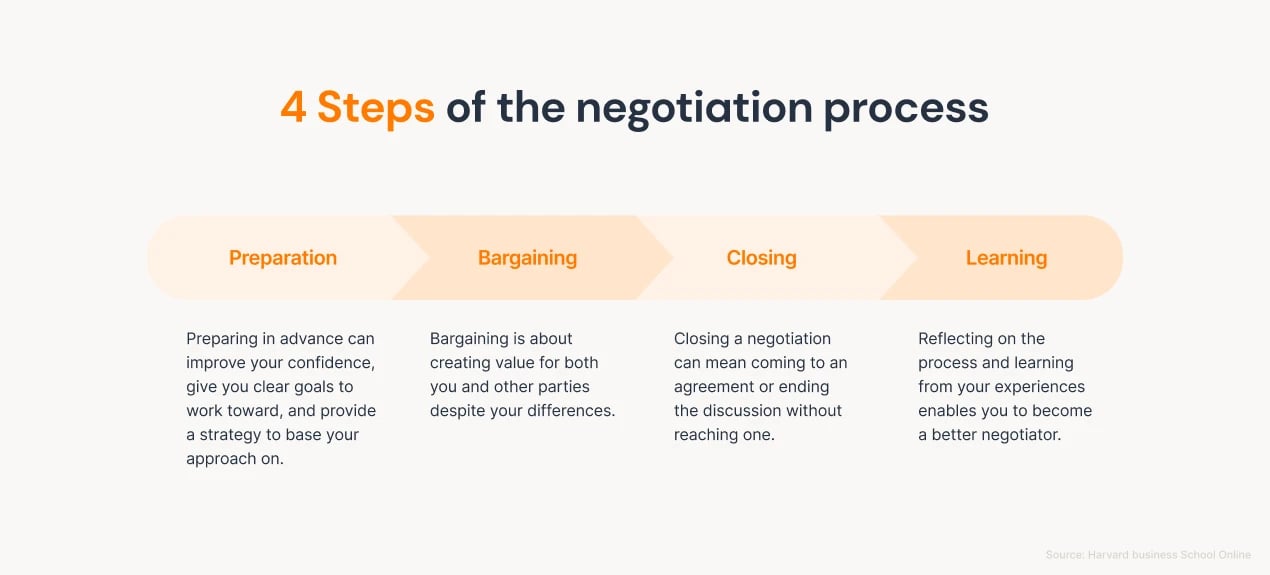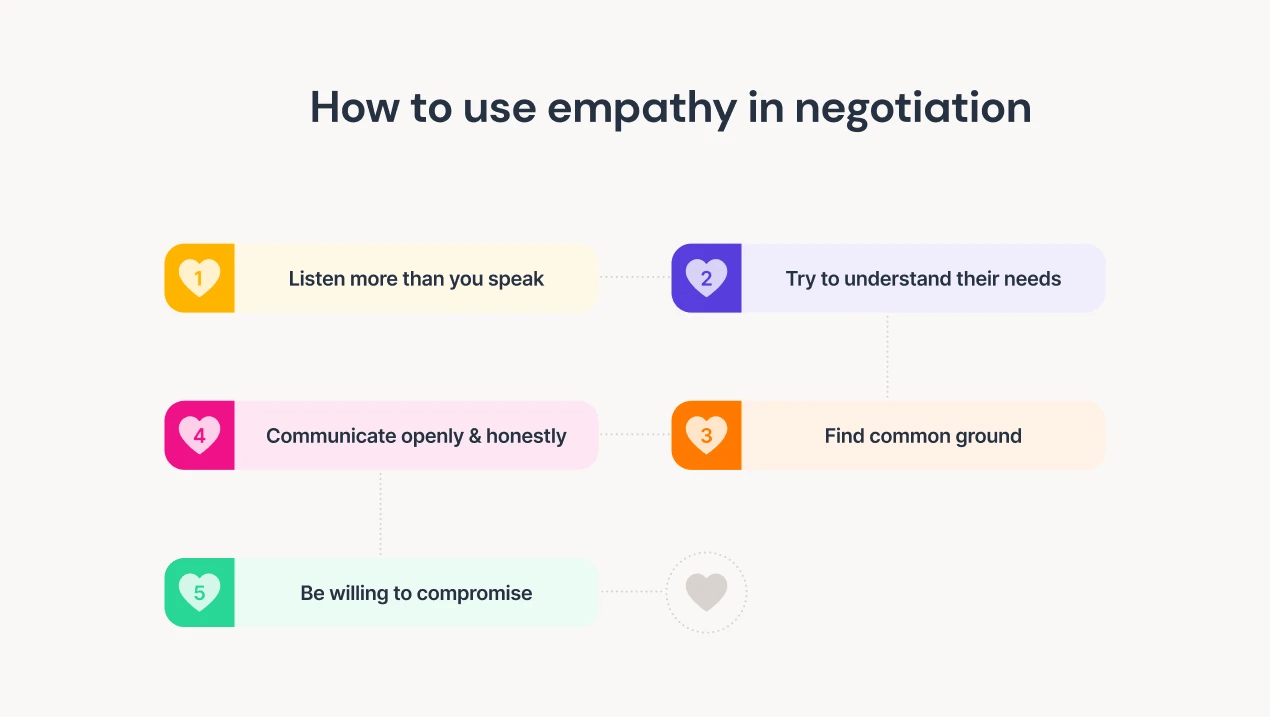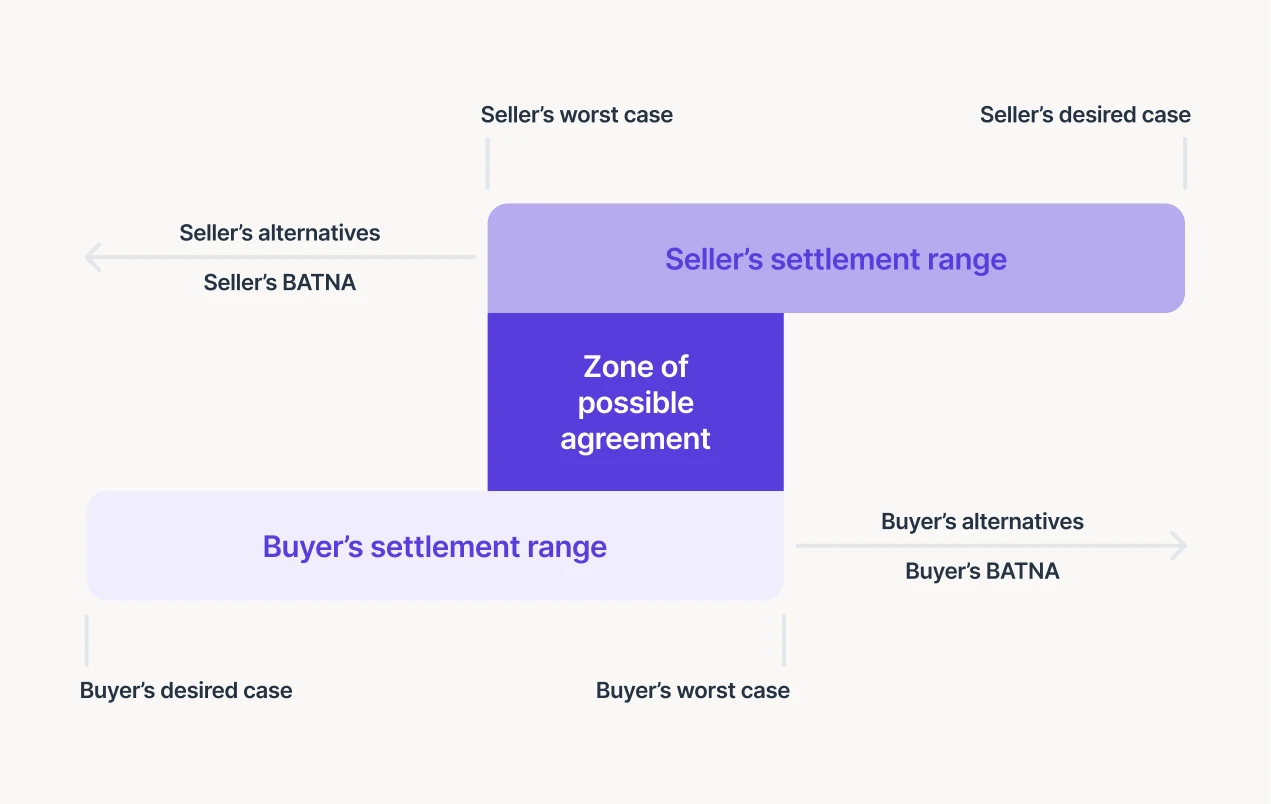Regardless of whether you have invested hours, weeks, or months in the sales journey, when you reach the negotiation phase of the selling process, you can lose the deal almost instantaneously.
And even for the sellers who can close a deal, the negotiated outcome may not always be the best.
But why does this happen?
Well, negotiation isn’t all that simple. Nowadays, buyers are armed with extensive information about the seller’s business, offerings, competitors, and pricing.
This puts undue pressure on the sellers. As a result, most sellers approach negotiations with anxiety, and real-world experiences confirm that anxious negotiators seldom perform well.
To handle negotiations that lead to favorable outcomes, sellers must be equipped with certain skills. They must utilize the best strategies and tactics that enable them to quickly adapt to the ever-evolving dynamics of the negotiation table.
Understanding sales negotiation
A sales negotiation involves a buyer and seller dialogue to close a sales deal.
Negotiations enable sellers to address a buyer’s concerns regarding a purchase by reinventing the value of the product/service and making compromises. Typically, negotiations involve a lot of opinions – with both parties approaching the discussion with the compromises they are willing to make to close the deal.
 (Source)
(Source)
Role of sales negotiation in business
In today’s world, sales processes have become complex and multifaceted. Negotiation plays a fundamental role in sales as it helps buyers and sellers arrive at mutually beneficial outcomes. Without effective negotiation, both salespeople and prospects are more prone to conflict when determining the best deals for themselves.
Additionally, negotiation presents an environment where both parties can convey their concerns and communicate constructively. With the right negotiation skills, sellers can demonstrate their expertise and capabilities, enabling buyers to invest in their products and services. This helps salespeople build enduring relationships with buyers.
Key sales negotiation skills
Now that you understand the importance of sales negotiation in business, you need to learn how to negotiate effectively. Here are the top five sales negotiation skills that will help you become a pro!
1. Preparation
You must know your customers to negotiate with them effectively. With more knowledge comes more power to deal with a strong case.
In a sales context, preparation means being aware of your buyer’s needs, purchasing power, customer journey, and other solutions they can consider if your negotiation falls through. Having all this information can put you in a position of strength and offer considerable leverage.
When preparing for the negotiation, you can incorporate social media benchmarks into your strategy. This will help you leverage the power of data and insights from online platforms to gather information about the prospect.
Moreover, it's important to consider the negotiation format (in-person or remote). Modern video calling platforms have many useful features, such as screen or slide sharing, which can also benefit you.
2. Active listening
While it’s essential to ask questions, listening to the answers is equally important. In any verbal communication, the key is to talk less and listen more.
Listening is a skill that ensures you understand your prospect’s needs, pain points, and goals. Once you understand their point of view, you can tailor effective responses that yield positive outcomes.
3. Conversation skills
Any good negotiator must continuously improve their conversation abilities and people skills.
The key to effective negotiation is to follow the SOP of keeping the conversation light. You must stay calm throughout the process and do everything possible to avoid the interaction from becoming hostile or toxic.
4. Empathy
Empathy is a key negotiation skill that lets you put yourself into the other party’s shoes and understand their perspective. With empathy, a salesperson can better understand their customer’s goals and come up with persuasive arguments. They can keep the conversation flowing and lead to overall smoother outcomes.
Empathy also helps to build rapport and long-lasting relationships with your prospects.
 (Source)
(Source)
5. Strategizing
There may be situations where the prospect is unsatisfied with your solution. Good negotiators often enter the discussion with one or more backup plans. So, if one solution doesn’t work out, they can strategize on the fly and offer a counter-solution.
6. Emotional intelligence
The ability to manage and control your emotions while dealing with the other party’s sentiments differentiates a good negotiator from a bad one. Negotiators who can control their emotions, even in high-pressure situations, and stay calm and composed can achieve better outcomes.
The do’s and don’ts of sales negotiation
The primary goal of negotiation must be to reach a reasonable and equitable deal for both parties. Here are some do’s and don’ts to remember for a good outcome.
Do's:
✅ Open with a strong offer
The importance of opening the discussion with a strong offer cannot be overstated. It immediately grabs the prospect’s attention and gets them more interested. It also demonstrates that you value their time and are dedicated to finding common ground.
Additionally, an attractive initial offer can serve as a lead-generation tool. Even if the negotiation doesn’t fall through, it encourages the prospects to engage with you in the future.
So, begin with clearly communicating the USP of your product or service. Leverage reciprocity by providing something of value upfront, such as a free sample or consultation. This can trigger a sense of obligation to reciprocate and consider your proposal.
✅ Make the first compromise
Negotiation is synonymous with compromise. It’s impossible to reach a common consent that is mutually beneficial without compromise.
When it comes to sales negotiation, making the first compromise is a strategic move that helps to foster trust. It demonstrates flexibility and allows you to steer the negotiation towards a positive outcome.
Make sure to start with a minor concession and connect it to a benefit valuable to the prospect. Maintain a clear bottom line while making concessions to ensure you don’t give away too much.
✅ Anchor the negotiation
Anchoring is a fundamental sales negotiation strategy that lets you set the tone for the discussion. Just like the anchor in the boat, anchoring in negotiation means centering on the first price as a reference point throughout the discussion. When you drop the first offering bid, all subsequent discussions will rely heavily on it.
Begin by anchoring on your terms. If you are the first party to make an offer, you can establish what is considered fair or standard in the discussion. Rather than asking the prospect how much they’d like to pay for your offerings, anchor the discussion to quickly set a benchmark figure.
✅ Create a sense of urgency
This is another effective persuasion tactic that leads to quicker closures. Urgency not only prompts the prospects to act decisively but also reinforces the idea of a valuable opportunity.
If applicable, highlight the scarcity of your product or service. You can also offer time-sensitive offers encouraging prospects to take swift action. Appeal to the prospect’s fear of missing out on a valued opportunity by sharing the success stories of other customers.
✅ Always have a Plan B
There are several myths in negotiation. And among them, the most common is that having a Plan B makes you weak. It provides an easy way out, hindering you from achieving your Plan A.
Good negotiators understand that it’s vital to think through all the possibilities. Having a fallback plan will prevent you from negotiating too hard or accepting a bad deal. So coming to the negotiation table with a well-thought-out BATNA (Best alternative to a negotiated agreement) is not a weakness but a necessity.
 (Source)
(Source)
✅ Be prepared to walk away
It’s understandable if sometimes you have to go slightly out of the way to close a negotiation. But if negotiations invariably turn irrational with meager profit margins and stubborn prospects, it’s time to respectfully walk away.
In the long run, it’s beneficial to work with prospects who fathom your value. Even if, after a long-drawn discussion, the prospect fails to realize the advantages of your offerings, it is a sign that you stop negotiating further and quit.
Don’ts
❌ Don’t develop negotiation strategies based on assumptions
Successful negotiation outcomes are based on facts and figures and not assumptions. That’s why it’s important to enter a negotiation with proper preparation.
Several lead enrichment tools can help you gather valuable data about the prospect and their business. Find out who the decision-makers are and what their aspirations are. Gather as much data as possible for a 360-degree awareness.
❌ Don’t be too predictable
Predictability can be a big faltering factor in sales negotiation. When your approach becomes too easily anticipated, it can reduce your effectiveness in navigating complicated discussions.
Let’s say you are promoting call center software. You may find your opponents anticipating your moves if you constantly provide the same terms, use the same negotiation tactics, or offer the same pricing structure. This can empower them to effectively counter your arguments, leaving you with a diminished scope of positive outcomes. Try to uncover innovative ways to dominate the negotiation conversation.
❌ Don’t neglect non-verbal cues
Many negotiators make the mistake of underestimating their non-verbal cues. This includes body language, tone of your voice, and anxiety levels.
Good negotiators exude confidence. They stay calm, composed, and patient as they approach the prospect. So make sure to firmly stand your ground during a negotiation. Coming across as being too sales-y about your product branding or too submissive will only make the opposing party come on to you more aggressively. So keep a check on your nerves to win the negotiation battle.
❌ Don’t rush the negotiation process
Often, negotiations take time. If you want the process to go smoothly, give your prospect time to settle. Don’t rush the process, especially if you want to build lasting relationships.
Shift the negotiation narrative from a confrontational battle to a fruitful conversation by talking a bit about yourself. This will showcase your openness, flexibility, and desire to strike a meaningful deal.
❌ Don’t over-negotiate
It’s important to maintain a balanced approach in negotiations. If you find yourself in a position of advantage, don’t push it too hard. If you become over-aggressive or over-demanding, it may impact your relationship with the customer.
Avoid burning bridges, as that will harm your business reputation in the long run. Prioritize building a smooth and amicable relationship with the prospect, which is key to successful negotiations.
Conclusion
Negotiation is a discussion, not a combat. Following the abovementioned strategies will help you create a win-win situation for everyone.
Sympathize with your prospect’s valid objections and expectations and enter negotiation with proper preparation. This will ensure you secure the best deal without feeling intimidated.




